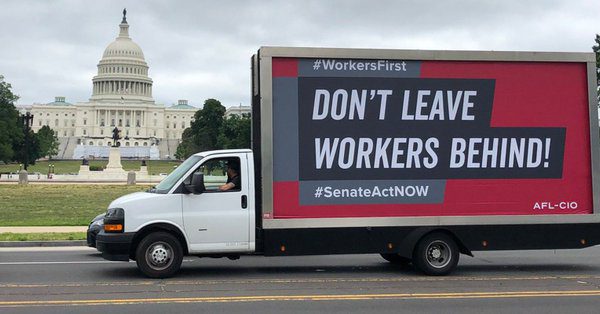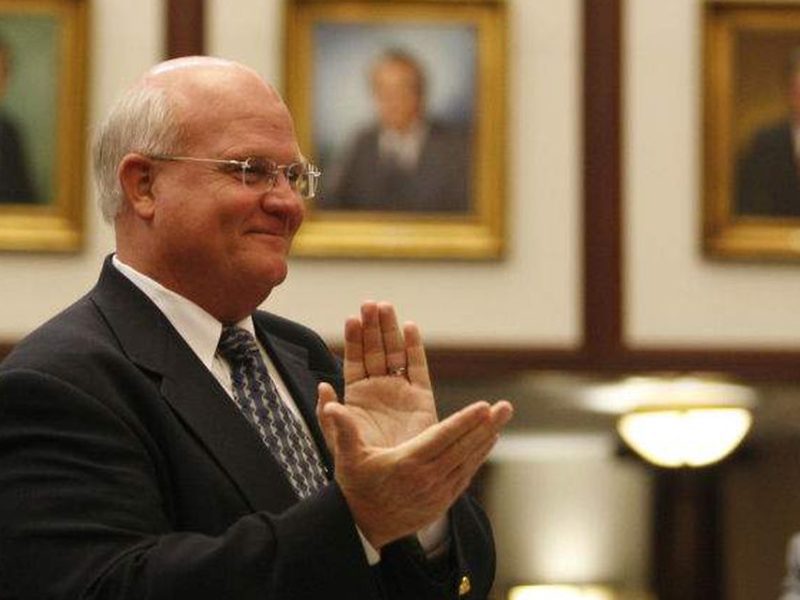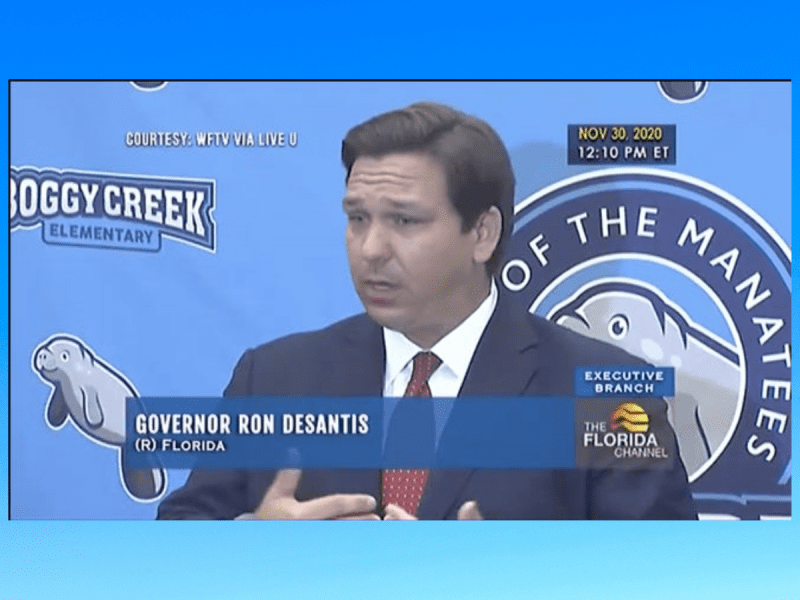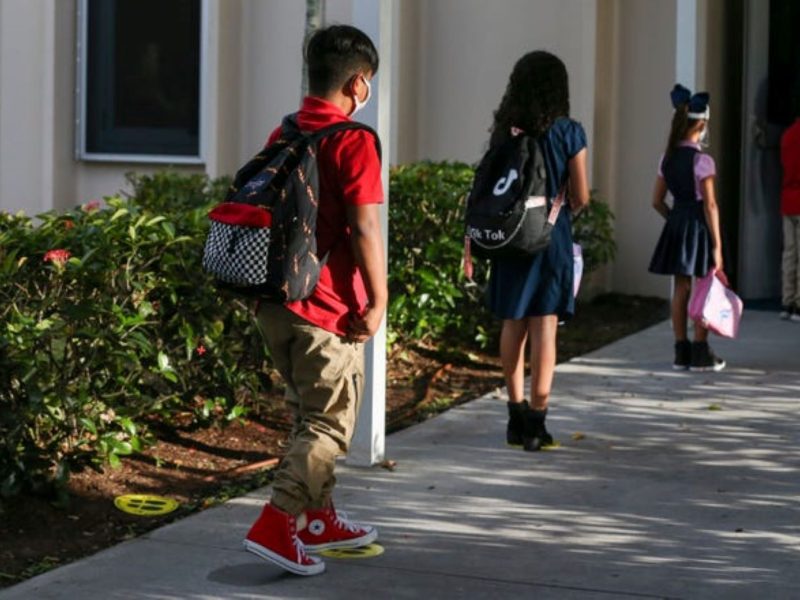As economies reopen amid COVID-19, many employees fear returning to work. Will they be safe?
Florida Phoenix By Laura Cassels June 22, 2020
As millions of workplaces reopen amid the coronavirus pandemic, employees from universities and corporations to restaurants and retail shops are likely afraid to go back to work and don’t know what to do about it.
Labor advocates say most workers fear a perfect storm: exhausting their unemployment benefits, needing to return to work to pay the bills, and wondering whether they will be safe in the workplace if safety guidelines are voluntary rather than mandatory.
Meanwhile, business advocates such as the Florida Chamber of Commerce say the economy cannot wait on delivery of a COVID-19 vaccine and that commerce must resume, with employers and workers addressing the hazards of coronavirus according to guidelines from the Centers for Disease Control and Prevention.
“What I’m hearing is there is a significant increase in the number of people who feel that going back to normal is worth the risk,” said Florida Chamber Executive Director Mark Wilson. He offered no opinion on whether voluntary workplace safety guidance is adequate to protect workers from the virus.
Meanwhile, cases of COVID-19 are on the rise in Florida as Gov. Ron DeSantis loosens restrictions on residents and businesses to boost the economy.
The Department of Health reported a string of record-setting daily increases last week, and the number of COVID-19 infections in Florida is approaching 100,000.
Through Sunday, the disease had killed 3,161 Floridians.
Recent research by the Center for State and Local Government Excellence indicates 80 percent of state and local public employees fear contracting the virus if they return to work.
“We are seeing concerns that, if not addressed, could drive workers out of the public sector,” said Rivka Liss-Levinson, SLGE’s director of research, in announcing the report last week.
Unions and employee advocates acknowledge that some workers have no fear and are eager to get back to normal regardless of workplace conditions, especially young, healthy people least affected by the virus.
They also acknowledge employers who have gone to great lengths to alter their business models in ways that reduce risk and give their workers options.
But most workers, the labor advocates say, feel they will have little choice but to work under whatever conditions they encounter.
One concern for workers left jobless by the pandemic is that the federal unemployment supplement of $600 a week, added to state benefits, is scheduled to end July 31, according to the U.S. Labor Department, though Congress could extend it.
In Florida, the maximum state payout is $275 a week and, with a few exceptions, that will run out before the end of the year, according to the Florida Department of Economic Opportunity.
With those cutoffs approaching, employees feel the strain of having to choose between their health in the workplace and paying the bills, said Jason Suggs, an unemployment insurance professional at the Maryland Division of Unemployment Insurance and president of Local 3642 of the American Federation of State, County and Municipal Employees.
Under pressure
“I can’t overstate how much pressure we feel,” Suggs said. “There’s no clear policy on what cleanliness or safety looks like when claimants have to go back to work.”
Chrystal Puryear, a member of Washington Teacher’s Union Local 6, said teachers planning to report back to work at schools this fall are worried.
“We’re concerned about whether we will have clean schools and personal protective equipment,” Puryear said.
Suggs and Puryear took part in a national, union-organized Workers First Caravan last week to demonstrate support for worker protections and relief related to COVID-19.
Similarly, some faculty at Florida’s universities and colleges are pushing back against plans to resume traditional work practices this fall, even in the presence of safeguards such as face masks and distancing protocols.
“A lot of faculty are in the medium- to high-risk category. Those people are obviously concerned about returning [to traditional workplaces] when numbers of cases are going up again,” said Karen Morian, president of United Faculty of Florida. “There is a push to be ‘open’ but … what does safety look like?”
The Florida Medical Association weighed in on Friday:
“In response to a dramatic increase in COVID-19 cases, the Florida Medical Association, the state’s largest physician organization, encourages local officials to adopt regulations requiring individuals to wear face coverings in public places,” FMA President Ronald F. Giffler, MD, said in an announcement Friday. “The science is clear. Asymptomatic infected individuals can release infectious aerosol particles while breathing and speaking.”
United Faculty of Florida is negotiating with administrators to allow teachers to work remotely rather than on campus if they feel at risk of contracting or spreading the disease.
Morian said the union has found no assurances from state and federal workplace regulators. “Will faculty be heard? People are worried,” Morian said, adding, “Administrators also are worried.”
Morian said professional ethics compel professors to teach in person because of the effectiveness, but they do not want to risk their lives to do so.
“That’s the conundrum,” she said. “They say, ‘I want to do my job and do my best by my students, but I have to protect my personal health and the health of my family. Is it going to be safe to do what I do?’”
Empowered by the union and often protected by tenured status, faculty members are able to negotiate the conditions under which they will work during the pandemic. For example, Morian said UFF is fighting efforts by some administrators to require faculty to provide medical proof of underlying health problems if they balk at teaching on campus at this point in the pandemic.
‘On your own’
But many employee sectors, especially in mostly non-unionized states such as Florida, have no such negotiating power.
Labor and employment-law attorney Richard “Rick” Johnson in Tallahassee said there is scant legal framework in place to ensure that all employers operate COVID-free workplaces because no coronavirus requirements have been defined in law. He accuses the Trump Administration of being pro-business and indifferent to labor.
“They [in the Department of Labor] aren’t going to do anything for workers,” Johnson said. “Some of the ones who go back to work will be so sorry when they get sick.”
Little has changed for workers despite coronavirus. As before, employees injured on the job are entitled to workers compensation benefits. If employers are found to have violated a safety standard, they face citations and sometime hefty fines.
In addition, employees may file state or federal whistleblower complaints if they believe an employer is violating safety laws. And injured workers may file lawsuits if they believe an employer deliberately inflicted injury through action or inaction, which is highly difficult to prove, Johnson said.
There are no legal protections against being fired during the pandemic for refusing to work in questionable conditions, he said, because the U.S. Department of Labor refused to adopt COVID-specific safety standards, leaving it to employers to decide whether to comply with CDC recommendations that are non-enforceable.
“There’s so little out there. What you have is really one thing: OSHA,” Johnson said, referring to the U.S. Occupational Safety and Health Administration.
OSHA regulates workplace safety through standards specific to certain kinds of workplaces, and through its “general duty clause” requiring employers to operate in ways that are broadly recognized as safe.
OSHA has declined to set a federal standard specific to COVID-19 as workplaces reopen, despite Congressional Democrats and the nation’s largest coalition of labor unions clamoring for it.
Eugene Scalia, secretary of the U.S. Department of Labor (and the son of the late U.S. Supreme Court Justice Antonin Scalia), decided it was “not necessary” to set what’s called an Emergency Temporary Standard (ETS) by which employers and employees could measure workplace safety during the pandemic.
The AFL-CIO, the largest coalition of labor unions in the nation, filed suit to compel the Labor Department to establish an ETS so that employers and employees alike would know what is required by law in these uncertain times to maintain workplace safety.
An appellate court ruled against the union.
Failure to establish protections
At the Florida Chamber of Commerce, Wilson, who also is chairman of the national Council of State Chambers, said the Florida Chamber is encouraging member businesses that are reopening to practice CDC guidelines and is providing 45,000 face masks to chamber members.
“We have not been focused on what federal agencies do,” Wilson said, adding “we trust them” to do their jobs. Employers and workers, he said, should practice common sense measures in their workplaces, though he acknowledged they don’t have to.
To set a good example, he said, employees at the Florida Chamber office must wear face masks and practice 6-foot distancing. The office is closed to visitors.
Deborah Berkowitz, a six-year veteran at OSHA who is now with the National Employment Lawyers Association, said she is stunned to see workplaces reopening in the absence of federal safety requirements specific to COVID-19.
“The federal government has stunningly failed to establish any required protections that employers must implement to protect workers. Everything CDC recommends or OSHA recommends is guidance — it is voluntary,” Berkowitz said in answer to questions from the Florida Phoenix.
As to OSHA’s performance, Labor Secretary Scalia confirmed to a U.S Senate committee on June 9 that out of more than 5,000 coronavirus-related workplace complaints reported to OSHA since coronavirus hit the United States, OSHA had issued just one citation. Scalia did not elaborate on that situation, saying simply that OSHA has up to six months to resolve such complaints.
U.S. Sen. Bob Menendez, a New Jersey Democrat, questioned Scalia about OSHA’s lack of emergency regulations and its record on COVID complaints.
“One citation out of 5,000 is unbelievable,” Menendez said to Scalia. ”Instead of ‘guidance’ you should be issuing Emergency Temporary Standards that are very clear under OSHA and that would make a clear example of what is acceptable to return to work safely and what is not acceptable, and those who are forced to return to work in a situation that is unacceptable will have a valid claim.”
OSHA should respond to COVID complaints immediately, Berkowitz said, not within a six-month window.
“Under the direction of the Secretary of Labor, OSHA has completely abandoned its mission to protect workers and has stuck its head in the sand,” Berkowitz said. “The federal government has said to workers: You are on your own.”






